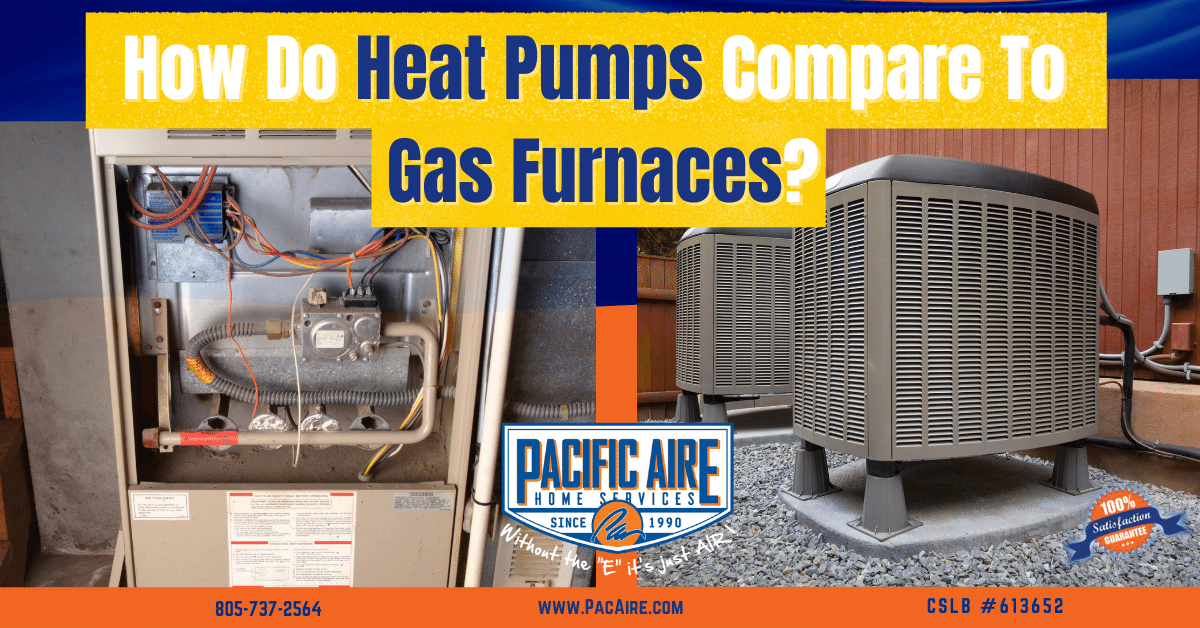Many homeowners have questions about heat pumps. How do you pump heat? Will this work as well as my furnace? Do I still get AC?
A heat pump or traditional gas electric system: what’s the difference? Well when it comes to air conditioning, nothing.
Both use refrigerant, kind of like coolant, to get your indoor coil cold and absorb the heat from your home. Then that refrigerant travels to your outdoor coil and releases the heat from your home to the outdoor air.
The difference is in heating.
In heating, unlike a Gas/Electric Furnace, which uses the hot exhaust from burning gas to heat your home, a Heat Pump simply runs the refrigerant in the opposite way, turning your outdoor coil cold to absorb the heat from outside. Then that refrigerant travels to your indoor coil and releases the heat into your home. It pumps heat into your home when you are cold and out of your home when you are hot.
Although you may just now be hearing about them, Heat Pumps have been around since the late 1940’s. Heat Pumps are very popular in Apartments, Condos and Townhomes due to their smaller size. And because they don’t have the same fire hazards that gas furnaces do, they’re capable of fitting into smaller spaces.
Worried about a little cold weather? Most Heat Pumps are designed to work down to 35 degrees without any backup heat source which makes them ideal for Southwestern regions like California. It also makes them just as energy efficient as a gas electric system.
The State of California is recommending that homeowners phase out old gas heating systems, because they create harmful NOx, or Nitrogen Oxide. The EPA now says these systems contribute to respiratory problems, smog, acid rain, and toxic chemicals in the atmosphere. The solution is to upgrade old heating systems to new clean, zero pollution “heat pump technology”. These new Heating systems are cleaner, safer, and can lower your energy bills.
What is a Heat Pump?
Heat pump systems are unique devices that are becoming increasingly popular. You can use them both for cooling and for heating. Unlike furnaces that create heat, heat pumps move it from one place to another. During the summer season, heat pumps transfer heat from inside your house to the outside, which operates similarly to a central air conditioner. A reverse process occurs in the winter season, as a reversing valve switches the refrigerant direction the heat is transferred from the outside to the inside of your home.
Advantages of heat pumps include:
- Works efficiently throughout the whole year.
- Reduces your heating and cooling costs.
- Electric heat pumps have no combustion gases and gas-powered heat pumps emit few emissions.
- This option is more environmentally friendly. Heat pumps can produce up to three times as much heat as they consume.
- A heat pump is generally more efficient than a furnace, especially in warm climates where they provide effective heating.
- Air-based heat pumps are efficient and safe. They can be used for both heating and cooling unlike furnaces.
- Less maintenance is required.
- It is a safer and healthier option for homeowners.
- Longer lifespan.
- Incentive programs are available.
- Generally, heat pumps are cheaper to install than electric resistance or fuel-based heaters. Speak with a qualified technician to understand the cost and benefits of a heat pump retrofit.
Due to its energy efficiency and lower impact on the environment, heat pumps are a great choice. Heat pump technology is constantly improving, and current models are significantly more efficient than they were five years ago.
What are Gas Furnaces?
In most cases, furnaces are combustion-fueled heating systems that run on gas or oil. Heat exchangers and burners are used in gas and oil-fueled furnaces to create heat, after which the air is blown through ductwork.
In California, gas furnaces are the most common type of heating. Natural gas is burned in furnaces to create heat. The heat is transferred to the air and spread through your home.
Disadvantages of Gas furnaces include:
- Compared to heat pumps, it is not as efficient.
- Installation is more expensive than gas- or electric-powered heat pumps.
- Heat pumps have a higher efficiency than natural gas furnaces, which are more prone to fires and CO poisoning.
If your air conditioner or furnace is struggling to keep up, replace it with a professionally installed, zero emission heat pump. Call 866-PAC-AIRE or visit https://www.pacaire.com/furnace-replacement-aw/ to schedule your Free In-Home Estimate today.


